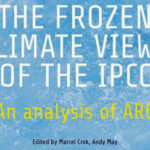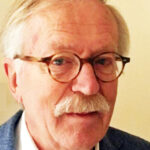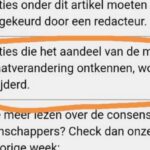Onlangs rakelde ‘The Guardian’ weer de beschuldigingen van ongewenste intimiteiten op van Rajendra Pachauri, voormalig voorzitter van het VN-klimaatpanel (IPCC), jegens een voormalig jongere medewerkster van het Indiase milieu–instituut, TERI, waarvan hij directeur is. Dat is opmerkelijk want ‘The Guardian’ heeft zich door de jaren heen als een trouw apostel van het broeikasevangelie opgesteld en altijd pal gestaan om het IPCC en zijn belangrijkste woordvoerders te verdedigen tegen de in de ogen van de krant ‘kwaadaardige’ kritiek van de klimaatsceptici.
Onder de titel, ‘Rajendra Pachauri speaks out over sexual harassment claims, ‘schreef John Vidal onlangs:
Nobel peace prize winner and former IPCC boss says climate change sceptics are behind allegations he harassed female colleague.
It was the crowning glory of a distinguished career when, in December 2007, the head of the UN’s Intergovernmental Panel on Climate Change, the charismatic Rajendra Pachauri, collected the Nobel peace prize in Oslo.
Elected by governments five years before to chair the small independent organisation charged with informing them on the state of global climate science, Pachauri had seen off the Bush administration, which loathed the IPCC for not taking its line on climate change. He had weathered vicious attacks by sceptics and steered the IPCC to worldwide acclaim.
The award, which he shared with Al Gore, was, he said, “a rare triumph for science” and for the many scientists who had been relentlessly attacked in the rightwing press.
Noot HL: Dit is onjuist. Pachauri heeft weliswaar samen met Al Gore de Nobelprijs voor de vrede ontvangen – men kan zich overigens afvragen wat beiden voor de vrede hebben betekend, maar dat terzijde – maar Pachauri ontving deze prijs niet als persoon maar als vertegenwoordiger van allen die aan het desbetreffende rapport van het IPCC hebben meegewerkt (waaronder ook ondergetekende als ‘expert reviewer’).
Nine years on, this international figure, who was named Indian of the year and has received major awards from dozens of countries, is lying low in Delhi. He is accused of sexual harassment, stalking and criminal intimidation of a young colleague whom he had employed as a researcher while he travelled the world seeking governmental support for action on climate change.
Faced with prison, ruin and disgrace when his case comes before the Delhi courts next month, Pachauri has resigned from the IPCC and stepped back from Teri, the huge energy research institute that he founded and which has taken solar lighting to hundreds of millions of Indians. Meanwhile, his many enemies are revelling in his discomfort, his health has suffered and he has been subject to death threats and demonstrations by women’s groups.
His accuser, who cannot be named, is a science graduate. She says he besieged her with offensive messages, emails and texts in the 16 months she spent working with him. In February 2015, she gave police a cache of several thousand electronic messages as evidence.
She says she rejected Pachauri’s “carnal and perverted” advances. “On many occasions, Dr Pachauri forcibly grabbed my body, hugged me, held my hands, kissed me and touched my body in an inappropriate manner,” she told police. …
Until now, Pachauri has said nothing about the case beyond denying all the charges, and claiming that his emails and computers had been hacked or misused. Now, however, in a series of emails with the Observer and in one meeting in London, he claims that his accuser was acting for money, and was probably set up to trap him by persons unknown. …
Through her lawyers, the woman has told the Observer that there is no truth in Pachauri’s claim that computers were hacked, and that the Delhi police are also convinced there is no truth in it. …
“There are emails, SMS messages and WhatsApp messages which categorically prove to the contradictory. It is a blatant lie being stated by Mr Pachauri,” said her lawyer, Prashant Mendiratta.
But Pachauri counters that, far from him chasing her, the correspondence shows that she had approached him. “She actively flirted with me and aggressively encouraged a deeper relationship between us.” …
He says he suspects strongly, but cannot prove, that there has been a coordinated attempt to destroy him professionally and personally and that money may also be involved. Ever since he was elected to lead the IPCC in 2002, he says the IPCC has been vilified by climate sceptics and rightwing free-market thinktanks, often known to have been funded by powerful fossil-fuel interests. …
For sceptics to force the resignation of the head of the UN’s climate panel would be a coup, undermining its scientific credibility and possibly derailing global agreement, he says. …
The next stage of the trial is set for April, after which Pachauri will be summoned to appear in the Delhi court. Until then, the man who as much as anyone persuaded the world to act on climate change is unable to act himself.
Lees verder hier.
Natuurlijk, Pachauri dient als onschuldig te worden beschouwd tot het tegendeel is bewezen. Maar hij heeft de schijn sterk tegen zich. In zijn erotisch getinte roman, ‘Return to Almora’, heeft Pachauri, zich als een eigentijdse Don Juan laten kennen. Het is denkbaar dat daarover in de Indiase culturele context andere opvattingen bestaan dan in de westerse samenleving, maar hier kun je dit soort schrijfsels beter niet op je CV hebben staan als je een maatschappelijk verantwoordelijke positie bekleedt.
Bovendien heeft een andere vrouwelijke medewerker van TERI soortgelijke beschuldigingen aan het adres van Pachauri geuit. Dus nu twee tegen één! Maar het artikel in ‘The Guardian’ maakte daar geen melding van.
Het is uiterst triest dat Rajendra Pachauri suggereert dat klimaatsceptici wel eens iets te maken zouden kunnen hebben met de beschuldigingen inzake zijn vermeende avances jegens zijn jongere medewerksters. Een dergelijk uitspraak wakkert het wantrouwen tussen de protagonisten en antagonisten van de menselijke broeikashypothese (AGW = ‘Anthropogenic Global Warming’) aan en kan een negatieve invloed hebben op pogingen om tot een constructieve wetenschappelijk dialoog tussen beiden te komen. En daar moeten we toch naar streven, hoe moeilijk dat tot dusver ook blijkt te zijn!
Voor mijn eerdere bijdragen over klimaat en aanverwante zaken zie hier, hier, hier, hier en hier.






Waarom verrast dit me niet? Aan de ene kant is het niet ongebruikelijk dat mensen in vooraanstaande posities hun erotische ambities niet in toom kunnen houden. Heeft misschien ook te maken met het feit dat macht erotiseert. Niet alleen vrouwen zijn het ‘slachtoffer’. Catharina de Grote liet zien dat je de rollen ook kon omkeren.
Het stuitende is dat er in veel gevallen, zoals hier, sprake is van ongewenste intimiteiten. Dan krijgt de positie van degene met macht in eens een heel andere betekenis:
Ook de hypocrisie en de leugenachtigheid zijn opvallend. Personen en instellingen met verheven doelstellingen die anderen de maat nemen, zoals pedofiele priesters, overspelige politici en Al Gore die rondvliegt in een privejet behoren steevast tot de overtreders van hun eigen verheven normen.
Tsja, hoe komt hij er toch bij om de klimaat sceptici als daders aan te duiden, terwijl toch de juffrouw in kwestie hierover heel duidelijk is? Wie overigens zijn relaas afturft tegen de DSM-5 kenmerken voor Narcistische Persoonlijkheidsstoornissen zal wellicht moeiteloos tot d vereiste vijf komen.
http://www.mayoclinic.org/diseases-conditions/narcissistic-personality-disorder/basics/symptoms/con-20025568
Dat verklaart dan meteen waarom al zijn vijanden schuldig zijn.
Ik krijg de indruk dat dat gevoel wel vaker voorkomt bij alarmisten.
Pachauri is oud nieuws maar dat HANS LABOHM als ‘expert reviewer’ bij het IPCC heeft gewerkt en dus een (gedeelde) Nobelprijs heeft gewonnen samen met Al Gore was voor mij nieuw nieuws. Ik wist het echt niet: een klein wereldje (mijn wereld) staat volledig op zijn kop. Respect Hans…
Uit je eerdere bijdragen blijkt dat je wel meer niet weet.
Nou ja, je weet wel wat, maar de verkeerde dingen.
Bijspijkeren? Begin hier: http://climategate.nl/page/420/
De nobelprijs was die voor de vrede (die maar niet wil komen), heeft niets te maken met de wetenschappelijke versie.